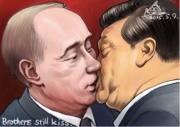|
apropos to nothing posted:do you think the majority of american workers see the us as an imperial power? theres chauvinism amongst the chinese workers just the same as there is in any nation. the US is the global superpower right now, but china is most assuredly an imperial power. the 1 thing imo that will completely alienate and destroy the american left is ignoring the actual movement of workers around the world. millions of people in HK are taking part in mass strikes and protests, with the primary demands being greater democratic control by the people, sparked mostly by the response to the extradition law which was repealed, and greater police accountability and control by the people. the potential is there and it is the same potential there was in occupy wallstreet and des gilets jaunes and every other protest movement of the past decade. and yet the problems remain the same as before, that the decentralised protest movement can be used, will be used, is currently being used, and was used and abused for ulterior movetives. from the very beginning the people who fanned up the peoples discontent into rage through their own anti-mainlander propaganda, those who sought to trigger these protests are getting exactly what they wanted. and there is nothing there for me as a socialist to... i dunno, connect with, connect to, something the beijing gov has imho acted with some restraint in their reaction, and i think that they would want to give HK at least something they want, problem being they have no one to negotiate with, and their proide or something wont let them to retreat either. so here we are
|
|
|
|

|
| # ? May 23, 2024 09:37 |
|
Kurnugia posted:the potential is there and it is the same potential there was in occupy wallstreet and des gilets jaunes and every other protest movement of the past decade. and yet the problems remain the same as before, that the decentralised protest movement can be used, will be used, is currently being used, and was used and abused for ulterior movetives. from the very beginning the people who fanned up the peoples discontent into rage through their own anti-mainlander propaganda, those who sought to trigger these protests are getting exactly what they wanted. and there is nothing there for me as a socialist to... i dunno, connect with, connect to, something you bring up a good point, the potential is there just like it was in all those other protest movements. and yes the reason they failed is a lack of a working class party. the job of revolutionary socialists right now is to build the party which would be capable of taking these struggles forward to victory on a socialist basis. that party doesnt exist now so we have to build it. how do we build it? by winning over the active participants of the working class which are involved in these movements. by explaining our approach to how we can win these struggles and knowing that the best sections of the movements will recognize our correct assessment of the problems of those movements and why they were unable to win their demands or make transformative change. a revolutionary party isnt built by outside forces it arises from the working class in the course of class struggle. a lot of new socialists were created out of the occupy movement and they were made because they saw the failures of the movement firsthand but also saw socialists and marxists intervening with demands and ideas which in hindsight, they could now recognize as being correct and if applied would have led to victory.
|
|
|
|
apropos to nothing posted:how can any mass movement exist that doesnt have a liberal character when the society we live in is a liberal capitalist one? like every anti-trump protest inevitably has organizers and at least 1 speaker but often times many more who support or encourage the russian collusion line for trumps impeachment and most of them have large elements that engage in red scare tactics against trump and russia. and yet these protests also contain individuals who view trump as a symptom of a systemic problem and can be won over to genuine marxist ideas. theres not a single marxist i know of who grew up as a marxist, they were all won over through the course of engaging in political struggle and seeing how class struggle really played out and having marxists talk to them and recruit them. if the marxists arent around then again, you just cede all those people and their movements to whatever reactionary or liberal ideas are dominant. politics is about winning people over. by originating in groups whose principal vested interest is not in the maintenance of the current system. it isn't about ceding some contested space to the reactionaries like you're proposing because that space has already been monopolized. if you're suggesting "raising a clear and independent marxist flag" within the context of a liberal movement is somehow likely to result in the adoption of marxist policy and not the immediate either ejection of, or complete defanging of, those marxist aspirations, I don't know what to tell you, because the history of every single mass movement in a liberal society is a history of deliberately integrating compatible demands into the prevailing system in order to deprive the movement of its revolutionary character. it has to be external to that, and the real question is how do Marxists cultivate a discourse that stands outside the existing parameters and assumptions of our liberal society? the point is that a movement has to be an organic set of demands for qualitative change emanating from an actual proletarian group unleavened by the dominance of bourgeois leaders and interests. attempting to coop a bourgeois, PMC led movement by injecting yourself into it with explicitly Marxist rhetoric isn't likely to (and hasn't ever) have a meaningful impact on reorienting those movements. just because people in the united states aren't raised as orthodox marxists doesn't mean the only way to teach people the Immortal Science is by trying to convince them their demand for higher marginal tax rates on the scions of billionaires should be for even higher ones - really, it's useless, by participating in these sorts of protests, Marxist entryists end up reifying incrementalist ideas revolutionary theory is about cultivating an organic movement that actually aspires to qualitative change, not attempting to change the character of elitist movements that are fundamentally opposed (and always will be) to actual demands for revolutionary alterations to the social order. the points you're making have been hashed out over and over by Marxist thinkers trying to reckon with the failure of socialist politics in the late 70s. if the civil rights movement, of all things - a genuinely massive demand for serious social change - was so easily coopted and integrated into Liberal monopoly capitalism, why would anyone think demands like those made by the bourgeois HK protesters for national autonomy or a bunch of old white hippies who think Elizabeth Warren is a serious progressive are going to morph into demands to erect gibbets on capital hill? they won't
|
|
|
|
gradenko_2000 posted:the left having to pick between supporting the HK protesters or not despite whatever portions of those folks are reactionaries is itself a reflection of the control exerted by capitalist media - there are class struggles going on right now in places like Ecuador and Haiti without any of the hair-splitting involved in having to relitigate "is China socialist???" over and over, and yet here we are having it out about China because because the BBC keeps running coverage of it for their own right-wing interests? it's frankly embarassing how much we've taken the bait this is kind of where i'm at- like all the questions about how to deal with the protests are ultimately tactical questions that the workers of china will have to deal with, and it's not like we can do anything other than an expression of solidarity
|
|
|
|
StashAugustine posted:not like we can do anything other than an expression of solidarity we could argue about it endlessly instead
|
|
|
|
It's important to defend China not because it's some ideal socialist state, but because the discourse around China by liberal media and the liberal left treats it as some sort of uniquely draconian or evil actor on the world stage - without recognizing that the first world operates in the exact same way if not worse. This discourse can only happen in the first place because of the unexamined assumption that the veneer of liberal democracy is a legitimizing totem, and without going through the motions of electoralism that automatically means you're authoritarian, whereas first world countries - who routinely have right wing and reactionary governments - somehow aren't.
|
|
|
|
Goast posted:we could argue about it endlessly instead such is the nature of posting
|
|
|
|
Pener Kropoopkin posted:It's important to defend China not because it's some ideal socialist state, but because the discourse around China by liberal media and the liberal left treats it as some sort of uniquely draconian or evil actor on the world stage - without recognizing that the first world operates in the exact same way if not worse. This discourse can only happen in the first place because of the unexamined assumption that the veneer of liberal democracy is a legitimizing totem, and without going through the motions of electoralism that automatically means you're authoritarian, whereas first world countries - who routinely have right wing and reactionary governments - somehow aren't. yeah i think i'm much more negative about china than you but the discourse about it in america is absolutely loving terrible. oh no they're giving countries loans they can't pay back to use as leverage, clearly this wicked plot was invented in beijing c 2009 and is not the entire purpose of western diplomacy ever since it became less cool to just invade
|
|
|
|
StashAugustine posted:yeah i think i'm much more negative about china than you but the discourse about it in america is absolutely loving terrible. oh no they're giving countries loans they can't pay back to use as leverage, clearly this wicked plot was invented in beijing c 2009 and is not the entire purpose of western diplomacy ever since it became less cool to just invade Getting real mad about Chinese land grabs in the south China seas. Oh our land grabs? Well all the first world countries got together and agreed that only the land grabs that happen after 1948 are illegitimate, and no takesies backsies.
|
|
|
|
I was talking about China's expanding rail infrastructure while complaining about traffic on the highway on the way to the movies the other night. My friend's friend, who I don't really know, said they should stop killing children so I said that we should probably stop doing that too and they shut up. I don't even know enough about China to uave firm opinions on it but the way Americans uncritically consume reporting about it without a hint of self awareness is ridiculous.
|
|
|
|
i take the true no book reading approach and while i have some vague opinions on china, ultimately it doesnt matter because im in the united states and my fight is here. on top of that it's completely impossible for me to learn anything about china that isnt filtered through at least one person's preconceptions because i dont read the language. thats without even getting to the part where theres so much bias when it comes to china in our media its impossible to tell if it's a fascist police state or just 'asian United States with a cooler flag' Idk what I'm getting at here but basically I ignore international news because it doesn't actually matter but more importantly how could you possibly form an opinion when half the articles we get is poo poo like BREAKING: CHINA PUTS LOW CREDIT SCORE CITIZENS IN SOYLENT FACTORY
|
|
|
|
i first learned about uighurs because the US tortured innocents in guantanamo here is the first thing i ever read about them, in this white wash new york times article "Out of Guantánamo, Uighurs Bask in Bermuda" lmao
|
|
|
|
and besides we literally have an ongoing ethnic cleansing campaign that most of our ruling class is completely fine with. and the opponents to it only suddenly got morals when they weren't the ones running said campaign anymore. so lmfao that an american can somehow feel superior to anyone else.
|
|
|
|
Pener Kropoopkin posted:Getting real mad about Chinese land grabs in the south China seas. Oh our land grabs? Well all the first world countries got together and agreed that only the land grabs that happen after 1948 are illegitimate, and no takesies backsies. I find it especially tedious that Philippine liberals haslve been in a state of constant meltdown over the
|
|
|
|
apropos to nothing posted:you bring up a good point, the potential is there just like it was in all those other protest movements. and yes the reason they failed is a lack of a working class party. the job of revolutionary socialists right now is to build the party which would be capable of taking these struggles forward to victory on a socialist basis. that party doesnt exist now so we have to build it. how do we build it? by winning over the active participants of the working class which are involved in these movements. by explaining our approach to how we can win these struggles and knowing that the best sections of the movements will recognize our correct assessment of the problems of those movements and why they were unable to win their demands or make transformative change. a revolutionary party isnt built by outside forces it arises from the working class in the course of class struggle. a lot of new socialists were created out of the occupy movement and they were made because they saw the failures of the movement firsthand but also saw socialists and marxists intervening with demands and ideas which in hindsight, they could now recognize as being correct and if applied would have led to victory. sounds like a lot of work with something i have exactly zero experience with. good luck tho. but wasn't your question about why the twitter left and presumably whatever remains of the international left aren't connecting and supporting the Honk Kong protest movement? because i dont even know where to start to go about with spreading an idea of this among my national party. they're p busy with party elections atm too
|
|
|
|
cenotaph posted:I was talking about China's expanding rail infrastructure while complaining about traffic on the highway on the way to the movies the other night. My friend's friend, who I don't really know, said they should stop killing children so I said that we should probably stop doing that too and they shut up. excuse me but that's whataboutism QED
|
|
|
|
quote:Of course the Chinese Communist Party (CCP) is aware of the problem – the so called “middle income trap” – which in reality occurs at the quite low income levels of high-end Third World countries like China, Mexico and Brazil. The CCP is attempting to overcome the roadblocks by upgrading China’s technological capacity, especially through the flagship Made in China 2025 policy framework. While the theory is very simple – nations must technically upgrade in order to continue to raise incomes – the practice is fraught. quote:Nothing in Trump’s policy indicates China is some kind of existential threat to US hegemony. To China boosters, the very existence of economic conflict between the US and China seems to prove their view of China’s rise. However, this is not the case any more than the existence of conflict between workers and their boss proves they stand on an equal footing, or are just the same thing. BrutalistMcDonalds fucked around with this message at 00:09 on Oct 11, 2019 |
|
|
|
apropos to nothing posted:do you think the majority of american workers see the us as an imperial power? theres chauvinism amongst the chinese workers just the same as there is in any nation. the US is the global superpower right now, but china is most assuredly an imperial power. the 1 thing imo that will completely alienate and destroy the american left is ignoring the actual movement of workers around the world. millions of people in HK are taking part in mass strikes and protests, with the primary demands being greater democratic control by the people, sparked mostly by the response to the extradition law which was repealed, and greater police accountability and control by the people. apropos to nothing posted:there is the potential for a genuinely revolutionary movement to take shape and the basis for one is forming in HK right now. yes there are elements of reaction within it and some of the protesters and their leaders are funded by pro-US interests theres no denying that. but there are also militant workers, trade unionists and marxists involved and fighting for the same demands. do you think the average HK worker taking part in the movement is doing so because they are pro-US imperialism, or even pro-communist? they are doing it because they support the demands of the movement. socialists should be supporting this movement and raising our demands within it precisely so that we can win support for our demands within the movement and defeat the reactionary forces within it. if you dismiss the protests as reactionary and a US state dept ploy, then invariably the only sympathy and support the protesters will find is among those reactionary forces and so it will become a strictly reactionary movement. marxists fight for our ideas within mass movements we dont cede them over to our enemies because they dont have a fully formed program. a socialist program isnt formed before class struggle occurs, it develops through the course of the class struggle. now is a time where marxists can be winning support among the working class in china and thankfully all the genuine marxist forces I know of there are doing just that. my worry is that too many marxists in the US will fail to learn this lesson and continue to dismiss mass movements which have a liberal character instead of genuinely engaging with them and trying to win people to marxist ideas and to a class struggle approach. as far as the state department ploy, not every protester or every protest with U.S. meddling is entirely product of the U.S. intelligence apparatus but it's not hard to find the records, with protest leaders having built up a resume via work for U.S. funded think tanks and CIA cutouts and have a direct line in with the media most americans consume on a daily basis and which shapes their view of the situation. the fortunate thing is that this will likely not escalate to the level of a ukraine or georgia color revolution, but will just remain focused on stirring up instability in the context of the trade war, with support declining over time as the protests fade out. then there will be editorials in D.C. magazines like The National Interest and in the NYT editorial section wondering why the U.S. "abandoned" hong kong while not correcting all the articles being published now denying U.S. involvement at all BrutalistMcDonalds fucked around with this message at 01:14 on Oct 11, 2019 |
|
|
|
BrutalistMcDonalds posted:the HK protests are a reaction to the end of china as an export-oriented industrial power in which HK has functioned as a spigot for the flow of capital while totally integrated into the world system. the HK protesters meanwhile have no interest in unity with the chinese working classes *on a class basis* as that would mean a reduction in real wages for HKers -- hence the anti-migrant attitude and support for immigration controls, and its overall reactionary shape with pepe frogs, colonial flags and funding from CIA cutouts such as the NED. it's a curious thing where analysis of the situation isn't judged on a material or class basis but on abstractions like "democracy" or "socialism" (used in abstract form and divorced from any real social relations: more "what i want out of socialism") where china is considered to have less socialist potential than HK as if we can reach that conclusion by moving sliders back and forth in a grand strategy game. rather, i'd look at china as an exploited, third-world / second-world country with very little room to maneuver in a world of U.S. imperialism. and while there are a lot of problems here there's not much talk about possible solutions on the U.S. left other than beating up on china for not living up to our own standards for what a socialist country should be like and raising a fist in solidarity with a mass-reactionary movement that wants to preserve its own position over a super-exploited chinese proletariat as wages gradually normalize i think that a ton of people basically just dont know poo poo about china and hong kong and so projected their "democracy" or "socialism" stuff onto the extremely shallow amounts of understanding they could gobble up in the first month of the protest and now they are just riding on that. people who have a materialist analysis of the situation were never the loudest voices from the outset and are having difficulty getting their voices to cut through the absolute noise of idiots and Gamers
|
|
|
|
color me surprised that the online western leftist movement somehow lacks a material analysis
|
|
|
|
the dipshit rich kid MTW I know's younger sister is a friend of mine and suddenly I wonder if he'll make time for her birthday because i now have a burning need to know what organizing is impossible guy's take on Hong Kong is
|
|
|
|
i don't think most of these people have ever heard anyone put forth a good faith or even critical support argument from the chinese side, ever, in their lives - and can't imagine what the actual conflict could be about aside from some moronic morality tale of democracy & freedom vs evil authoritarianism. something that i like about carl zha, even though i don't really agree with all his takes, is that he 1) knows chinese and has a chinese point of view but is 2) an american surfer dweeb and understands how to frame his arguments and understands what your average westerner doesn't understand - he's self aware of the limits, misconceptions, and common questions or gaps that people like me have. so it's helpful to have that so i can view the conflict without it being purely eating from the trashcan of ideology
|
|
|
|
it's just so loving frustrating that no matter how hosed up and evil our country is revealed to be (and always was, if you read even a single history book that's not a loving high school text book), theres a certain kind of middle class person that will insist that we're still better than Them, and we're more just and more free, and they definetly arent rich ha ha, I mean I still have house payments folks, somehow without ever realizing that most people cant afford to even get a mortgage in the first place
|
|
|
|
could my comfortable first world life give me a biased view point? nah, the whole world is bad and its only the pure shining city on the hill that can see the badness for what it is from our lofty heights
|
|
|
|
i mean the most retrospectively awful realization i ever went through was how the German SDP went through with supporting WW1 - nationalism, revanchism, insane views of the world despite ostensibly "getting" socialism. what seems like the most rational thing in the moment can cause the smartest people to make the dumbest decisions
|
|
|
|
Larry Parrish posted:it's just so loving frustrating that no matter how hosed up and evil our country is revealed to be (and always was, if you read even a single history book that's not a loving high school text book), theres a certain kind of middle class person that will insist that we're still better than Them, and we're more just and more free, and they definetly arent rich ha ha, I mean I still have house payments folks, somehow without ever realizing that most people cant afford to even get a mortgage in the first place i mean even if the part of my brain that thinks the us is better overall than china rears up its pretty much only because we've been sitting on the plundered wealth of the rest of the world long enough that we've learned to be polite about it. china's got at least one wholesale genocide left before they've finished the imperialist's ascent also im kinda drunk but w/e
|
|
|
|
there is no power in the unjust hierarchy. they have the tanks and the planes and the bombs but they have no way of encouraging anyone to reinforce the system. which is why in our country it's mostly psychopaths and cowards defending it, and everyone else is just tired of the beatings. imperialists dont ascend, they just drag people lower than them
|
|
|
|
extremely good
|
|
|
|
The truth, the whole truth and only the truth. I appreciate the jab at David Harvey, who's an expert at stripping the parts of marxism that enable it to lead to the most critical correct conclusions and giving the resulting wrong conclusions a shell of erudition and radicalism. It's a travesty that he's probably the most popular Capital explainer in the anglosphere.
|
|
|
|
uncop posted:The truth, the whole truth and only the truth. I appreciate the jab at David Harvey, who's an expert at stripping the parts of marxism that enable it to lead to the most critical correct conclusions and giving the resulting wrong conclusions a shell of erudition and radicalism. It's a travesty that he's probably the most popular Capital explainer in the anglosphere. my understand of value is pretty weak, and i'd like to go through Capital at some point, so is there a better explainer of value / Capital than Harvey, or is it better to go in dry?
|
|
|
|
i was listening to david harvey's podcast and he seemed to have a lot of positive things to say about china's model
|
|
|
|
CGI Stardust posted:is there a good comparison of an orthodox approach to value and Harvey's approach anywhere - heard he's pretty unorthodox to the point of being actively wrong? Harvey himself does a decent comparison of the orthodox and counter-orthodox interpretations here: http://davidharvey.org/2018/03/marxs-refusal-of-the-labour-theory-of-value-by-david-harvey/ What is the case that both of the approaches Harvey outlines in the post are simultaneously right and wrong, they both pick on one side of Marx's analysis and raise it to be the whole thing. Harvey's approach is pretty obviously the more radical of the two because unlike the other, it understands how Capital is principally a critique of political economy in the ricardian tradition. Harvey's weakness in dialectical reasoning is his understanding of contradiction, and it shows in how he throws out the side of Marx's critique that was about developing the ricardian tradition further after realizing that it wasn't the principal side of his contradictory approach to political economy (on one hand a development, on the other a fundamental critique), and so he for example can't understand why Marx was so enthusiastic about discovering a mathematical explanation for the tendency of the rate of profit to fall and discounts the emphasis on it as Engels posthumously misintepreting Marx's point. For Harvey, value defies mathematical analysis in a way that makes it impossible to base claims of these kinds of hard, deterministic tendencies on it. He utilizes Marx in an anti-scientific, mystifying fashion to build a bridge from Marx to the fashionable poststructuralist-inspired left who want to replace mainstream economics in policy decisionmaking with a "let's not imagine we can predict things, let's just try to do the right thing and see what happens" kind of approach.
|
|
|
|
damm. he sounds like the poster boy for the no book reading club. but, like, the kind that doesnt want to read books because they dont want to feel guilty about their bougioise lifestyle and not the kind who doesnt want to read theory books because they take 10,000 words to explain basic concepts
|
|
|
|
I bought Harvey's companion to Capital to read alongside, was that a bad idea. Is there someone else who has a more orthodox interpretation I can read along with.
|
|
|
|
Harvey's companions to Capital are intended to get the reader through all three volumes for the first time, and they're fine for that, provided you read critically. The problems with his interpretation of Marx don't really affect the value his introductory and popularizing works, but are far more apparent when he gets into discussions with other established Marxists, particularly economists and value theorists. I don't think there is a more accessible intro to Capital out there unless you count that manga from a few years ago, which I haven't read.
|
|
|
|
I thought Lenny Flank's "Contradictions of Capitalism" was a great intro to Marxism, though the final part of the book is really unsympathetic to Marxism-Leninism which seems to indicate that they're writing from an Anarchist or one non-ML tendency. But yeah, the first three-quarters of the book are top-notch and I'd recommend it. https://www.amazon.com/Contradictions-Capitalism-Introduction-Marxist-Economics-ebook/dp/B00295QJ0E
|
|
|
|
Pablo Nergigante posted:I bought Harvey's companion to Capital to read alongside, was that a bad idea. Is there someone else who has a more orthodox interpretation I can read along with. ur hosed dude. once you finish Harvey’s book you’ll start thinking, maybe ML isn’t an immortal science. soon you’ll be convinced hierarchies are bad and then... polyamory. seen it happen hundreds of times
|
|
|
|
re: soviet tech i'm aware of the technological breakthroughs that the soviets achieved in the space race. the other example raised was with the electronics/computing stuff, and even there the gap between the soviets and the west can be accounted for by contingent political decisions rather than something intrinsic to soviet-style central planning. these examples still accord with my general understanding of soviet techonological development tho. it was either focused on catching up to the west, or it was spurred onwards by competition with the capitalist powers. i don't bring this up to denigrate what the soviets achieved or to repeat some meme about the soviet economy. but if you have a model of domestic technological innovation that either 1) relies on imports to catch up to more advanced powers, or 2) is dependent upon competition with more advanced capitalist powers (mainly in the military sector), then idk if there's anything applicable to a how technological development in an already advanced capitalist-turned-socialist country should proceed. idk if that makes sense. if it does, i'm getting the underlying information from michael ellman's books. i'll look back over what he said about the subject and follow up some other stuff re: this topic. but if anyone can recommend me reading, or just make a point that's more in-depth than "but the space race," i'd appreciate it. thanks Finicums Wake fucked around with this message at 02:27 on Oct 12, 2019 |
|
|
|
it sucks that one of the posters who could've suggested stuff to read was run out of the forums by some guys who think making a funny post about a fart that smells like poop, playing video games, and watching anime makes them better at discerning genocides than the UN lol. i thought most of homex's takes were bad, in the sense that they were too tankie, but i liked that he could post them + would try to back them up. it'd be cool if he comes back and posts again just w/o the admin/mod stuff. if not, someone invite me to the rhizzone so they can tell me about soviet technological developemnt thanks
|
|
|
|

|
| # ? May 23, 2024 09:37 |
|
Finicums Wake posted:re: soviet tech yes that's about right. communist economies can focus a lot of capital at single problems more easily than capitalist economies. the USSR was focused on industrial goods, which segwayed well into rockets for ICBMs. The space race was the public marketing side of the ICBM race, and Russia made way more nuclear weapons than the US did. Consumer goods didn't receive the same level, except maybe in the Kruschev era. PCs are basically consumer goods lol homex got banned, drat rip 🙏
|
|
|



























